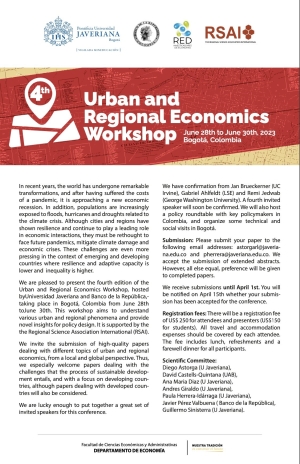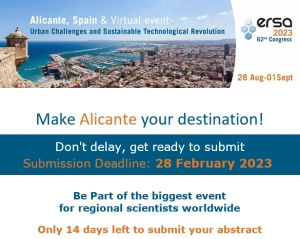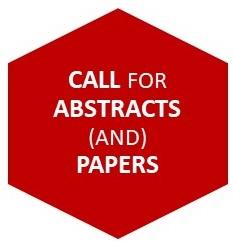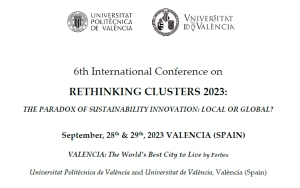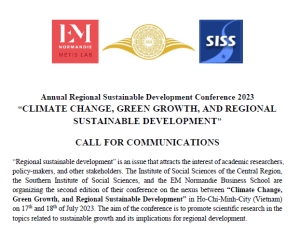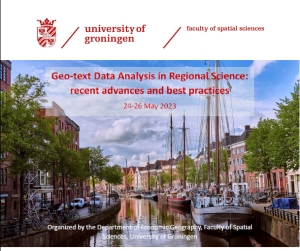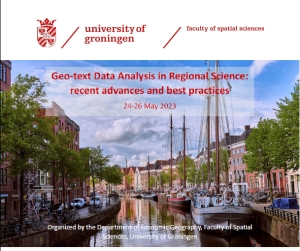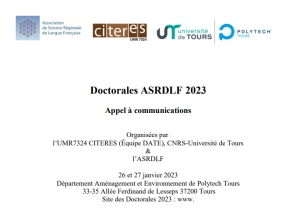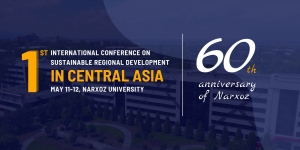Archives
Elisabete Martins
4th Urban and Regional Economics Workshop, June 28-30, 2023 Bogotá, Colombia
In recent years, the world has undergone remarkable transformations, and after having suffered the costs of a pandemic, it is approaching a new economic recession. In addition, populations are increasingly exposed to floods, hurricanes and droughts related to the climate crisis. Although cities and regions have shown resilience and continue to play a leading role in economic interactions, they must be rethought to face future pandemics, mitigate climate damage and economic crises. These challenges are even more pressing in the context of emerging and developing countries where resilience and adaptive capacity is lower and inequality is higher.
We are pleased to present the fourth edition of the Urban and Regional Economics Workshop, hosted byUniversidad Javeriana and Banco de la República,- taking place in Bogotá, Colombia from June 28th toJune 30th. This workshop aims to understand various urban and regional phenomena and provide novel insights for policy design. It is supported by the the Regional Science Association International (RSAI).
We invite the submission of high-quality papers dealing with different topics of urban and regional economics, from a local and global perspective. Thus, we especially welcome papers dealing with the challenges that the process of sustainable develop- ment entails, and with a focus on developing coun- tries, although papers dealing with developed coun- tries will also be considered.
We are lucky enough to put together a great set of invited speakers for this conference.
We have confirmation from Jan Brueckerner (UC Irvine), Gabriel Ahlfeldt (LSE) and Remi Jedwab (George Washington University). A fourth invited speaker will soon be confirmed. We will also host a policy roundtable with key policymakers in Colombia, and organize some technical and social visits in Bogotá.
Submission: Please submit your paper to the following email addresses: astorgarl@javeria-na.edu.co and pherrera@javeriana.edu.co. We accept the submission of extended abstracts. However, all else equal, preference will be given to completed papers.
We receive submissions until April 1st. You will be notified on April 15th whether your submis- sion has been accepted for the conference.
Registration fees: There will be a registration fee of US$ 250 for attendees and presenters (US$150 for students). All travel and accommodation expenses should be covered by each attendee. The fee includes lunch, refreshments and a farewell dinner for all participants.
Scientific Committee:
Diego Astorga (U Javeriana), David Castells-Quintana (UAB), Ana Maria Diaz (U Javeriana), Andres Giraldo (U Javeriana),
Paula Herrera-Idárraga (U Javeriana),
Javier Pérez Valbuena ( Banco de la República), Guillermo Sinisterra (U Javeriana).
PhD position at Politiecnico di Milano, Department ABC
PhD position at Politiecnico di Milano, Department ABC
The PhD candidate is expected to contribute to the research in the frame of the GRINS project, financed by the NRRP, in particular under the ‘Innovation - ecosystems for the circular economy’ pillar.
The project is aimed at investigating the socio-economic impact of the green and digital transition, with a particular focus on local labour market dynamics and wage inequalities across occupations, sectors and territories.
Expression of interest and request of information can be addressed to Camilla Lenzi and Andrea Caragliu (email: camilla.lenzi@polimi.it, andrea.caragliu@polimi.it).
ERSA2023 Call for Abstracts (and) papers: Submit now!
|
|
|
|
|
|
|
|
|
|
|
|
Call for Papers: 6th International Conference on RETHINKING CLUSTERS, 28-29 September 2023, VALENCIA (SPAIN)
6th International Conference on
RETHINKING CLUSTERS 2023: THE PARADOX OF SUSTAINABILITY INNOVATION: LOCAL OR GLOBAL?
September, 28th & 29th, 2023 VALENCIA (SPAIN)
VALENCIA: The World’s Best City to Live by Forbes
Universitat Politècnica de València and Universitat de València, València (Spain)
The sixth edition of the international conference “Rethinking clusters” will be in-person in the sunny and Mediterranean Valencia, named the World’s Best City to Live by Forbes (in here: https://www.internations.org/expat-insider/2022/best-worst-cities-for-expats-40327).
We would like researchers’ contributions on the general topics of Innovation in Places, enhancing when possible the constructs of clusters, industrial districts and regions. Being innovation in space the leitmotiv of the Conference, we like to discuss new trends based on Sustainability, Circular Economy, Artificial Intelligence, Networks, and the importance of place for innovation and development.
Interested contributors are invited to send an extended abstract or a full paper to the email address info@rethinkingclusters.org by June 1st, 2023.
Extended abstracts should contain a minimum of 500 words and a maximum of 2500 words. Extended abstracts can contain figures, tables and/or images which are not included in the word count.
Full papers (optional) should not exceed 8000 words, inclusive of the abstract (maximum 150 words), tables, references, figure captions, endnotes. Full papers will be circulated among participants.
Members of the community that are willing to organize a Special Session within the workshop are kindly invited to send an email to info@rethinkingclusters.org before May, 1st, including a description of the contents of the session and a list of the participants. The acceptance of the extended abstracts/full papers will be announced by June 24th, 2023.
Registration and fee. Registration is about 165 Euros, including the Conference, materials, Key Notes, coffee breaks, Paella show cooking (real and best!) and Great Gala Dinner. Only the Abstracts will be published in an ISBN Conference proceedings.
Rethinking Clusters
Call for Papers | International Conference on Regional Sustainable Development, 17-18 July 2023, Ho-Chi-Minh-city (Vietnam)
Annual Regional Sustainable Development Conference 2023 “CLIMATE CHANGE, GREEN GROWTH, AND REGIONAL SUSTAINABLE DEVELOPMENT”
CALL FOR COMMUNICATIONS
“Regional sustainable development” is an issue that attracts the interest of academic researchers, policy-makers, and other stakeholders. The Institute of Social Sciences of the Central Region, the Southern Institute of Social Sciences, and the EM Normandie Business School are organizing the second edition of their conference on the nexus between “Climate Change, Green Growth, and Regional Sustainable Development” in Ho-Chi-Minh-City (Vietnam) on 17th and 18th of July 2023. The aim of the conference is to promote scientific research in the topics related to sustainable growth and its implications for regional development.
Focus topics
Papers proposed could include the following topics (not limited to):
- Climate change and Sustainable Agriculture
- Green Business and Sustainability
- Climate change, Welfare, and Mitigation measures
- Climate change and Corporate Social Responsibility
- Circular Economy and Sustainability
- R&D, Innovation, and Sustainable Growth
- Vulnerability and Resilience
Round table
A mini economic forum on “Sustainable Tourism in the Digital Age: Evidence from the Southern Region of Vietnam.”
Participants: EM Normandie Business School, Southern Institute of Social Sciences, Institute of Social Sciences of the Central Region, experts and local agencies and managers.
Submission
Please send an extended abstracts or full manuscript through the following website:
While submitting, please specify the topic where the manuscript would be presented in case of acceptance.
Important dates
Deadline submission for full paper: April 21st, 2023 Paper notification to authors: May 29th, 2023 Registration open: May 2nd, 2023
Registration fee
The registration fee is 250 € for each participant.
Further info will be provided.
Publication opportunities
A special issue will be dedicated to the best papers of this conference. Further information will be provided.
Conference board
CASTELLANO Sylvaine, Dean of faculty, EM Normandie Business School, France HOANG Hong Hiep, Director of Institute of Social Science of the Central Region, Vietnam NGUYEN-HUU Thanh Tam, EM Normandie Business School
TRAN Minh Duc, Vice director of Institute of Social Science of the Central Region, Vietnam VU Tuan Hung, Vice director of Southern Institute of Social Sciences, Vietnam
Scientific committee
ARMANDO Papa, University of Teramo, Italy
BOURDIN Sébastien, EM Normandie Business School, France
BUI Quang Tuan, Director of Vietnam Institute of Economics, Vietnam CILLO Valentina, University of Rome 3, Italy
CONDOR Roland, EM Normandie Business School, France
DEL GIUDICE Manlio, Editor in Chief of Journal of Knowledge Management, Link Campus University, Italy
DANG Xuan Thanh, Vice director of Vietnam Academy of Social Science, Vietnam FIANO Fabio, Link Campus University, Italy
JUTEAU Solène, EM Normandie Business School, France LAMOTTE Olivier, EM Normandie Business School, France
LARÉ Amandine, Head of Economics, Territories and Sustainable Development Department, EM Normandie Business School, France
LE Quoc Hoi, Editor in Chief of Journal of Economics and Development, National Economics University, Vietnam
LE Van Cuong, Associate Editor of Journal of Public Economics Theory, CNRS, Paris School of Economics, France
LE Van Hung, Vice director of Institute of Regional Sustainable Development, Vietnam LUONG Tinh, Institute of Social Science of the Central Region, Vietnam
MAGNI Domitilla, University of Rome 3, Italy
NAM Sang-Woo, KDI School of Public Policy and Management, Korea
NGUYEN Truong Son, The University of Danang - University of Economics, Vietnam NGUYEN Van Phu, Paris Nanterre University, France
PARK Jin, KDI School of Public Policy and Management, Korea
PHAM Hoang Van, Hankamer School of Business, Baylor University, United-States PHAM Si An, Vietnam Academy of Social Sciences, Vietnam
PHAM Thi Kim Cuong, Paris Nanterre University, France
PHAN Thi Song Thuong, Institute of Social Science of the Central Region, Vietnam RIEBER Arsène, University of Rouen Normandy, France
SINGH Sanjay Kumar, Maynooth University, Ireland
TRAN Nam Binh, University of New South Wales, Australia TRAN Thi Anh-Dao, University of Rouen Normandy, France
TRINH Thi Thu, Institute of Social Science of the Central Region, Vietnam VENKATESH V.G., EM Normandie Business School, France
VU Bang Tam, University of Hawaiʻi at Hilo, America WON Hee Lee, Han Kyong University, Korea
Local organization committee
DINH The Toan, Institute of Social Sciences of the Central Region TAN Thi Hai Hanh, Institute of Social Sciences of the Central Region
NGUYEN Hoang Yen, Institute of Social Sciences of the Central Region NGUYEN Tuan Sinh, Southern Institute of Social Sciences
TU Thi Phi Diep, Southern Institute of Social Sciences
VU Thi Hong Nhung, Southern Institute of Social Sciences DO Ly Hoai Tan, Southern Institute of Social Sciences
VU Thi Thu Thanh, Southern Institute of Social Sciences
Time and Venue
- Time: July 17th and 18th, 2023.
- Venue: Ho-Chi-Minh
1 day + 1 day trip:
- 17/7/2023: All day conference.
- 18/7/2023:
- ½ day Round table
- ½ day Trip (with additional fees).
Workshop on Geo-text Data Analysis in Regional Science: recente advances and best practices, 24-26 May 2023, University of Groningen
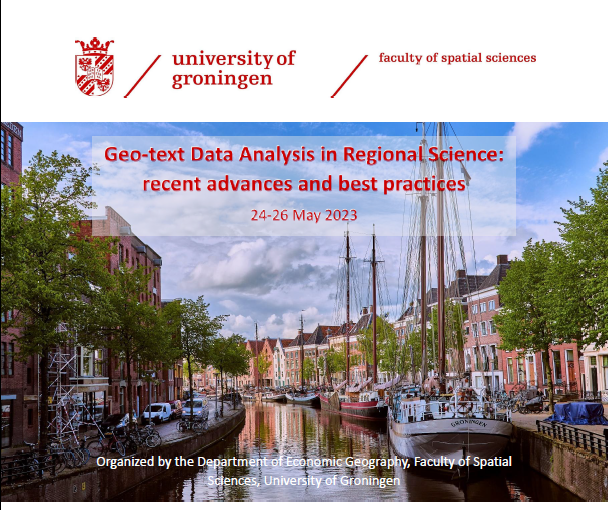
Background and objectives
The exponential growth of ‘big data’ coupled with enhanced computational capacity and high-performance machine learning techniques provides high-potential research opportunities for the field of Regional Science. User-generated text data is of particular interest, as it often has implicit spatial information embedded within (e.g., informal place references, place relations, place opinions/emotions). These types of geo-text data (Hu, 2018) can shed new light on regional economic development, labor market dynamics, and geographies of knowledge production and knowledge relations in a way that traditional secondary data cannot. Some studies in regional studies have already used this new geo-text approach, for example, the digital footprint of interfirm linkages (Kinne and Axenbeck 2020; Abbasiharofteh, Kinne, and Krüger 2021), Twitter data and news items (Ozgun and Broekel 2021), online job vacancies (Acemoglu et al. 2020), but also digitized historical newspaper archives (Peris, Meijers, and Van Ham 2021).
Textual data offers numerous advantages. It gives us the ability to create a bottom-up classification of groups and definitions rather than relying on existing definitions. Combined with web scraping techniques, it allows for high-volume flexible yet robust analysis. But there are also challenges concerning the reproducibility of results and online-data bias; nevertheless, geo-text analysis holds great promise for regional science research and should be leveraged much more than currently.
The aim of the geo-text workshop is threefold. First, this workshop invites leading experts to deliver keynote talks on their latest research findings on the topic and showcase recent methodology development. Second, this program creates a venue where about 20 early career researchers and PhD students in regional science learn from one another and discuss future research ideas and potential collaborations. All participants will be able to present their work and receive feedback from senior scholars and their peers. We would like to also encourage the exchange of information on the skills needed to perform text analysis, and we will have technical ‘sweat’ sessions in the program. Lastly, the workshop includes a social event and other opportunities to facilitate informal knowledge exchange, discussions, and brainstorming to inspire the next generation of researchers to take the next step.
Keynote speakers and publication options
We are happy that four distinguished scholars in the field of regional sciences will attend the workshop. Besides delivering keynote talks on the recent advances, case studies, and future challenges in using geo-text data analysis, they provide valuable feedback to presenters. The invited guests are:
- Tom Brökel, University of Stavanger, Norway
- Rikard Eriksson, Umeå University, Sweden
- Martin Henning, University of Gothenburg, Sweden
- Evert Meijers, Utrecht University, the Netherlands
A selected number of high-quality papers presented at the workshop will be proposed for further consideration in a special issue of an academic journal.
Submissions
We invite PhD students and early career researchers (five years between the date showing on their PhD certificate and the workshop date) to send us an extended abstract (max. 1000 words) featuring original and unpublished research on text analysis applied in geographic research, including but not limited to the following topics:
- geo-text mining - geographies of knowledge production
- novel datasets and analytical methods - geographies of green transition
- regional economic development - diffusion of clean technologies
- labor market dynamics - knowledge relations
- regional occupation space - place-based policy
To allocate enough room for discussion and feedback, each presenter has 45 minutes (including Q&A) to present his/her research.
Please send your extended abstract by 15 March to geotext@rug.nl which includes your name and affiliation.
Important dates*
Paper submission deadline: 15 March 2023
Acceptance notification: 31 March 2023
Material submission for discussants: 15 May 2023
Workshop days: 24-26 May 2023
* All deadlines are at 11:59 CET on the corresponding date
Workshop organization and costs
The workshop will be held in the vibrant city of Groningen, known for its rich history, charming canals, cobbled streets, and thriving cultural scene. The faculty of Spatial Sciences at the University of Groningen is recognized internationally for excellence in research and teaching in spatial and regional sciences. The geo-text workshop is planned as a three-day event, organized in a workshop atmosphere with keynote talks and thematic paper sessions with PhD students and early career researchers’ presentations. The workshop includes a lightning session and a tutorial.
Participation in the workshop itself is free of charge. We booked hotel rooms for presenting participants. We cover the costs of the hotel, and the workshop includes lunches, refreshments, and two dinners. Participants need to cover other costs associated with their travel themselves. The workshop is supported by the Regional Science Association International (RSAI) and the European Regional Science Association (ERSA) and facilitated by the Jantina Tammes School for Digital Society, Technology, and Artificial Intelligence.
Call for Applications | Workshop on Geo-text Data Analysis in Regional Science: recente advances and best practices, 24-26 May 2023, University of Groningen

Background and objectives
The exponential growth of ‘big data’ coupled with enhanced computational capacity and high-performance machine learning techniques provides high-potential research opportunities for the field of Regional Science. User-generated text data is of particular interest, as it often has implicit spatial information embedded within (e.g., informal place references, place relations, place opinions/emotions). These types of geo-text data (Hu, 2018) can shed new light on regional economic development, labor market dynamics, and geographies of knowledge production and knowledge relations in a way that traditional secondary data cannot. Some studies in regional studies have already used this new geo-text approach, for example, the digital footprint of interfirm linkages (Kinne and Axenbeck 2020; Abbasiharofteh, Kinne, and Krüger 2021), Twitter data and news items (Ozgun and Broekel 2021), online job vacancies (Acemoglu et al. 2020), but also digitized historical newspaper archives (Peris, Meijers, and Van Ham 2021).
Textual data offers numerous advantages. It gives us the ability to create a bottom-up classification of groups and definitions rather than relying on existing definitions. Combined with web scraping techniques, it allows for high-volume flexible yet robust analysis. But there are also challenges concerning the reproducibility of results and online-data bias; nevertheless, geo-text analysis holds great promise for regional science research and should be leveraged much more than currently.
The aim of the geo-text workshop is threefold. First, this workshop invites leading experts to deliver keynote talks on their latest research findings on the topic and showcase recent methodology development. Second, this program creates a venue where about 20 early career researchers and PhD students in regional science learn from one another and discuss future research ideas and potential collaborations. All participants will be able to present their work and receive feedback from senior scholars and their peers. We would like to also encourage the exchange of information on the skills needed to perform text analysis, and we will have technical ‘sweat’ sessions in the program. Lastly, the workshop includes a social event and other opportunities to facilitate informal knowledge exchange, discussions, and brainstorming to inspire the next generation of researchers to take the next step.
Keynote speakers and publication options
We are happy that four distinguished scholars in the field of regional sciences will attend the workshop. Besides delivering keynote talks on the recent advances, case studies, and future challenges in using geo-text data analysis, they provide valuable feedback to presenters. The invited guests are:
- Tom Brökel, University of Stavanger, Norway
- Rikard Eriksson, Umeå University, Sweden
- Martin Henning, University of Gothenburg, Sweden
- Evert Meijers, Utrecht University, the Netherlands
A selected number of high-quality papers presented at the workshop will be proposed for further consideration in a special issue of an academic journal.
Submissions
We invite PhD students and early career researchers (five years between the date showing on their PhD certificate and the workshop date) to send us an extended abstract (max. 1000 words) featuring original and unpublished research on text analysis applied in geographic research, including but not limited to the following topics:
- geo-text mining - geographies of knowledge production
- novel datasets and analytical methods - geographies of green transition
- regional economic development - diffusion of clean technologies
- labor market dynamics - knowledge relations
- regional occupation space - place-based policy
To allocate enough room for discussion and feedback, each presenter has 45 minutes (including Q&A) to present his/her research.
Please send your extended abstract by 15 March to geotext@rug.nl which includes your name and affiliation.
Important dates*
Paper submission deadline: 15 March 2023
Acceptance notification: 31 March 2023
Material submission for discussants: 15 May 2023
Workshop days: 24-26 May 2023
* All deadlines are at 11:59 CET on the corresponding date
Workshop organization and costs
The workshop will be held in the vibrant city of Groningen, known for its rich history, charming canals, cobbled streets, and thriving cultural scene. The faculty of Spatial Sciences at the University of Groningen is recognized internationally for excellence in research and teaching in spatial and regional sciences. The geo-text workshop is planned as a three-day event, organized in a workshop atmosphere with keynote talks and thematic paper sessions with PhD students and early career researchers’ presentations. The workshop includes a lightning session and a tutorial.
Participation in the workshop itself is free of charge. We booked hotel rooms for presenting participants. We cover the costs of the hotel, and the workshop includes lunches, refreshments, and two dinners. Participants need to cover other costs associated with their travel themselves. The workshop is supported by the Regional Science Association International (RSAI) and the European Regional Science Association (ERSA) and facilitated by the Jantina Tammes School for Digital Society, Technology, and Artificial Intelligence.
In Memoriam: Ronald E. Miller (1934-2023)

Ronald Eugene Miller, Professor Emeritus at the University of Pennsylvania, died unexpectedly on January 26, 2023, at the age of 89. He received the North American Regional Science Council’s David Boyce Award for Service in 1995 for his long, productive career as the Managing Editor of the Journal of Regional Science (1963-1996), as 1986-1987 Vice President of the Regional Science Association, as well as his administrative work at the Regional Department at Penn. In 2006, Regional Science Association International recognized Ron’s body of academic work through the Walter Isard Award for Scholarly Achievement. He was elected a Fellow of the Regional Science Association International in 2012. Ron is perhaps best known for co-authoring, with Peter D. Blair, three editions of Input- Output Analysis: Foundations and Extensions (1985, 2009, 2022).
Born in Seattle, WA in 1934, Professor Miller received a B.A. in Economics at Harvard University in 1955 under the tutelage of Robert Kuenne, who had written a dissertation under Walter Isard in applied input-output (I-O) analysis. Ron’s senior thesis won the Newcomen Prize in Business History, part of which was published in 1957 as “The Impact of the Aluminum Industry on the Pacific Northwest: A Regional Input-Output Analysis” in the journal Review of Economics and Statistics. After a hiatus as a Fulbright Scholar at the Universities of Heidelberg and Munich in 1956, Ron received an M.A. in Economics at the University of Washington in 1957 under then Assistant Professor Arnold Zellner. He subsequently enrolled as a Ph.D. candidate at Princeton University’s Department of Economics. As Ron liked to tell it, his dissertation committee was composed of three secondary authors: Richard Quandt of Henderson & Quandt (1958), Microeconomic Theory: A Mathematical Approach, an advanced microeconomics textbook standard; Oskar Morgenstern of von Neumann & Morgenstern (1944), Theory of Games and Economic Behavior; and Robert Kuenne of Isard & Kuenne (1953), “The Impact of Steel upon the Greater New York–Philadelphia Industrial Region,” an early application of input-output analysis for measuring economic impacts. Ron’s 1961 dissertation was published by the MIT Press in 1963 as Domestic Airline Efficiency: An Application of Linear Programming. It should be no surprise then that his career focused on mathematical economic modeling.
In 1962, Ronald E. Miller, Ph.D., joined the recently formed Regional Science Department at the University of Pennsylvania. There he joined Walter Isard, Benjamin H. Stevens, and their first Ph.D. student, William Alonso. Forever the prototypical Princeton alumnus, Ron quickly developed into a talented teacher and professor, advising scores of graduate students and receiving Penn’s highest award for teaching in 1988. University-wide, his courses perennially ranked near the top in undergraduate student evaluation scores. His basic input-output (I-O) course was required for both graduate and undergraduates in Penn’s Regional Science Department. Lecture notes from these classes as well as from an advanced “topics in I-O analysis” seminar later culminated into early chapters of the 1985 edition of Input-Output Analysis: Foundations and Extensions once Peter Blair joined the Department’s faculty in the mid-1970s. He taught other courses on mathematical programming as well. In 1995, Ronald E. Miller was promoted to Professor Emeritus status by the University of Pennsylvania, to which he had loyally devoted his entire career.
Professor Miller authored and co-authored scores of articles, authored or co-authored six books, and edited two volumes. After publishing his dissertation, Ron refocused his research attention on measuring interregional feedback effects in multiregional I-O models. The earliest of these works are still widely cited today for their development of a technique called “hypothetical extraction,” the first of which (1963) corrected some equations in a salient piece by Professor Leon Moses then at Harvard University.
Ron’s broad knowledge, instant recall of obscure articles, and careful editorial eye will be sorely missed. He also was a frequent and willing manuscript referee and an occasional book reviewer. Ron was also known by colleagues and students for his tidy and organized office and with rare exceptions keeping an immaculate desktop. This led his less orderly, but very close colleague Ben Stevens to assert publicly that “Ron’s so neat he keeps his telephone in a drawer.” When queried about this later, Ron chuckled, replying that just prior to Ben’s weekly arrival to his office Ron made sure to tuck the telephone in his desk. Needless to say, it was great to be within earshot of the banter between these two fast friends. In any case, Professor Ronald E. Miller’s humor and wit will be remembered fondly. It could be snarky and at times biting but was always delivered with a smile and twinkling eyes and in a gentlemanly manner.
Books Authored or Coauthored.
Edited Volumes.
Doctorales ASRDLF 2023, 26 et 27 janvier 2023
Les Doctorales 2023 ASRDLF auront lieu à Tours, les 26 et 27 janvier 2023.
Elles sont organisées par l’UMR7324 CITERES (Équipe DATE) à l’université de Tours.
Comme vous le savez, ces journées s’adressent aux doctorant(e)s et aux chercheur(e)s qui travaillent sur les problématiques territoriales et régionales de sciences humaines et sociales (aménagement, économie, urbanisme, géographie, gestion, histoire, droit, sciences politiques, sociologie, etc.).
Elles sont un temps d’échanges et de débats privilégiés entre jeunes chercheurs et chercheurs confirmés. Elles se déroulent sous la forme d’ateliers thématiques ou méthodologiques au cours desquels, les doctorants présentent leurs travaux de thèse devant plusieurs enseignants-chercheurs, chercheurs confirmés et autres jeunes chercheurs afin de partager les regards, d’enrichir les expériences et de récolter des conseils sur leur travail.
1st International Conference on Sustainable Regional Development in Central Asia May 11-12, 2023 | Narxoz university, Almaty, Kazakhstan
Sustainable Regional Development in Central Asia"
(Ryskulov Readings - 2023)
This year, on May 11 and 12, Narxoz University , together with The Regional Science Association International , is holding an international conference on sustainable development in Central Asia "The 1st International Conference on Sustainable Regional Development in Central Asia" (Ryskulov Readings - 2023).
RSAI is the publisher of the Regional Science Policy & Practice (RSPP) - Q2 journal in the Scopus database. According to our agreement, all abstracts approved for presentation by the scientific committee of the conference will be considered by the editors of the journal for publication in the format of an article absolutely free of charge. All other papers will be published in the conference proceedings.
The conference is also dedicated to a significant date - the 60th anniversary of Narxoz University. The university, established in 1963, has trained more than 140,000 graduates for the economy of Kazakhstan, and in 2023 Narxoz draws a jubilee line under its past and reveals grandiose plans for the future.
About Us
The Regional Science Association International (RSAI), founded in 1954, is an international community of scholars interested in the regional impacts of national or global processes of economic and social change.

